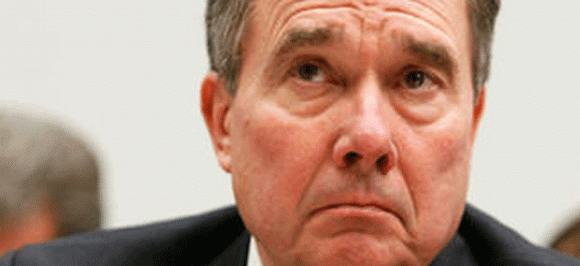Gil Kerlikowske, noted opponent of California’s failed attempt to legalize pot in 2010, is leaving his position as U.S. drug czar to become head of U.S. Customs and Border Protection. The announcement was made in early August
Kerlikowske has served as head of the Office of National Drug Control Policy since 2009, when he was appointed by President Obama. Soon after taking the office, he declared the administration would no longer use the term “war on drugs,” considering it counterproductive.
But the announcement was more a matter of semantics than policy change: The federal government continues to enforce draconian drug laws that incarcerate thousands of non-violent offenders for simple possession charges.
Indeed, the Obama administration has already spent more to crack down on medical marijuana than both of his predecessors combined. Police will arrest about 700,000 Americans for marijuana crimes this year, and military drones are being used to hunt down pot farmers.
Pressed at one point about what exactly had changed about the war on drugs, Kerlikowske insisted it had become less violent and was therefore no longer a war.
“The difference that I see is the level of violence in the United States and the training that law enforcement goes through,” he said in 2011. “Whether they’re dealing with an armed robbery or taking down a drug house, and given the number of officers who are shot and killed anymore, and the type of weaponry that is out on the streets, I don’t think there’s any way to approach it from a safety standpoint that wouldn’t involve this.”
Criticized as a feckless drug czar with little imagination or vision and no inclination toward reform, Kerlikowske mostly carried on the policies of his predecessors. That included blocking international efforts at progressive drug reform. He once described Nancy Reagan’s “just say no” campaign as one of the “major successes” of the war on drugs.
He has been quoted as saying “marijuana is dangerous and has no medicinal benefit” and “our opposition to legalizing marijuana is grounded not in ideology but in facts and experience.”
 Kerlikowske played a notable role in some big drug-related fights. When California voters went to the polls in 2010 to decide whether they wanted to legalize weed, Kerlikowske threatened the federal government would sue the state if they took that step.
Kerlikowske played a notable role in some big drug-related fights. When California voters went to the polls in 2010 to decide whether they wanted to legalize weed, Kerlikowske threatened the federal government would sue the state if they took that step.
Voters rejected Prop 19 by 500,000 votes out of 7 million cast. “Californians recognized that legalizing marijuana will not make our citizens healthier, solve California’s budget crisis or reduce drug related violence in Mexico,” Kerlikowske said at the time.
Nonetheless, he stayed out of the same waters when Colorado and Washington voted to legalize weed. Both those initiatives passed, yet in the following months, Kerlikowske and other administration officials with input into drug policy have said little about the implications for federal law enforcement.
Now that he’s moving on to Customs, it remains to be seen whether Kerlikowske will have any more luck stemming the flow of cannabis at the border than he has had preventing its use in the United States.
 California Marijuana Market Breaking "Marijuana News" from CA
California Marijuana Market Breaking "Marijuana News" from CA


